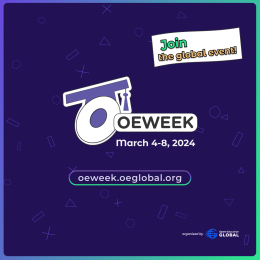
In celebration of Open Education Week (March 4-8, 2024), the UCSB Library is highlighting one lecturer’s experience incorporating open educational resources (OERs) into her courses. As the Library continues to deepen its commitment to an open paradigm for research and teaching, we want to support more faculty and lecturers who are interested in using OERs to help create a learning environment with fewer technical, financial, and copyright barriers.
Katie Baillargeon is a Senior Continuing Lecturer in UCSB’s Writing Program. She teaches a range of academic writing courses, runs UCSB's Dissertation Write-in for graduate students across the campus, and provides faculty writing consultations and workshops. Her research interests are varied, and include graduate student writing, how dissertation boot camps aid student writers, food writing, and 17th-century French opera.
In this interview with the Library's Open And Affordable Course Materials Committee, she shared why she incorporated OERs in her classes.
 In which classes do you use open educational resources (OERs)?
In which classes do you use open educational resources (OERs)?
Definitely in Writing 1 and 2, and as much as possible in my upper division courses.
How did you end up deciding to use these free and open resources?
I have always been sensitive to the cost of textbooks for students, especially in understanding the overall cost per quarter. I was a biology major for a few years as an undergraduate student and I remember the exorbitant cost back then. I can only imagine how high it is now. Being able to lighten that financial burden is important to me.
Did the OERs replace another costly textbook?
Yes, particularly for Writing 1 and 2.
What do you think of the quality of the OERs you use compared to other textbooks?
I think that open resources are of high quality, or I wouldn’t use them! I enjoy being able to select more targeted, specific readings from open-access sources as opposed to relying on an entire textbook from which I may not even use more than one chapter.
How have students reacted to your use of free OERs?
Students’ responses have been uniformly positive. I don’t think I’ve ever had a student complain about saving money! The most typical comments I get express gratitude that I don’t require an expensive textbook and happiness with the ease of access—downloading a PDF, essentially.
What would you say to other instructors considering using open educational resources for teaching at UCSB?
Go for it! It might take a bit more initial work to find and tailor the resources you want to share with your students, but it’s well worth it. Once you know where to look—OER Commons is a good place to start—it is increasingly easier to keep tabs on updated materials.


